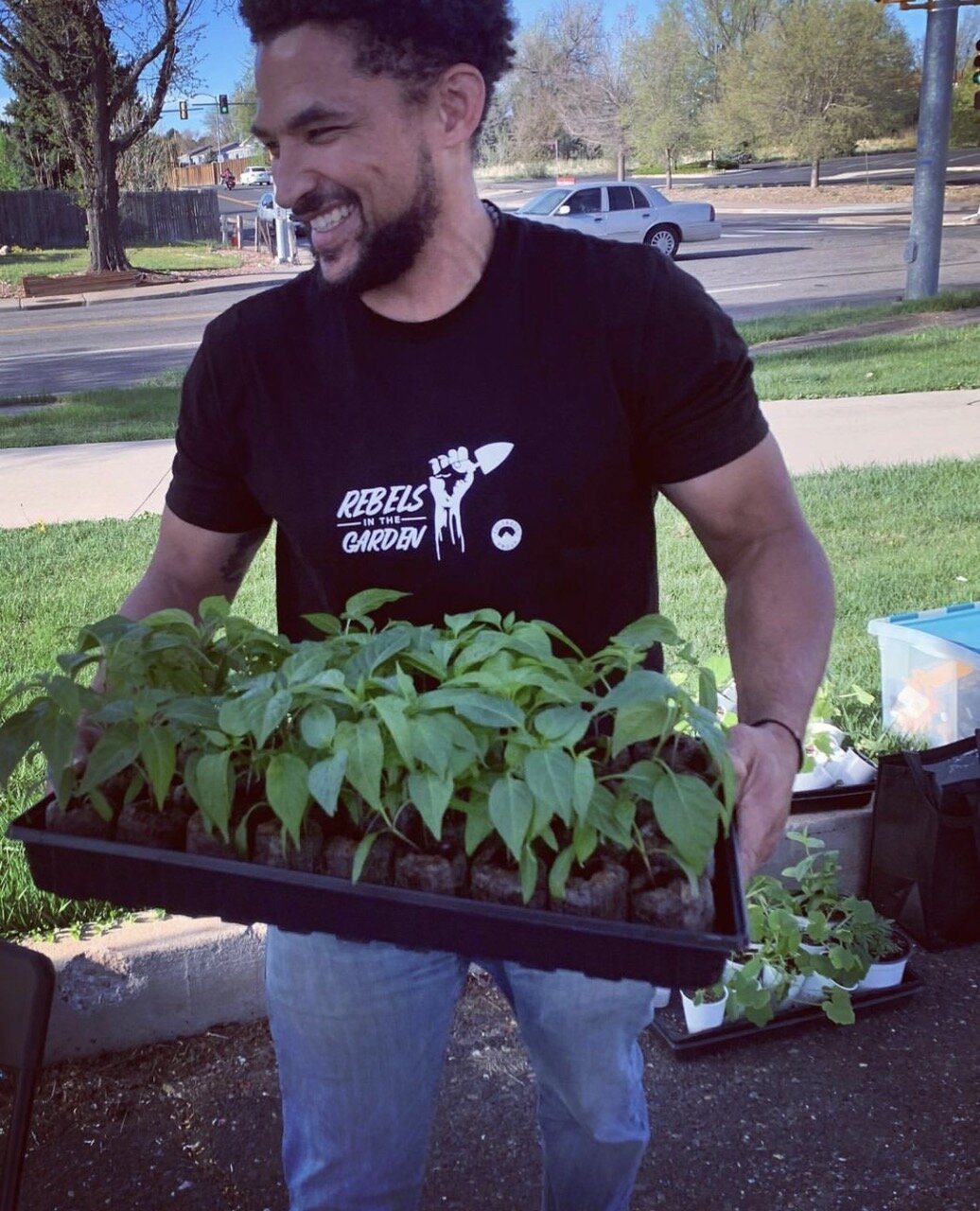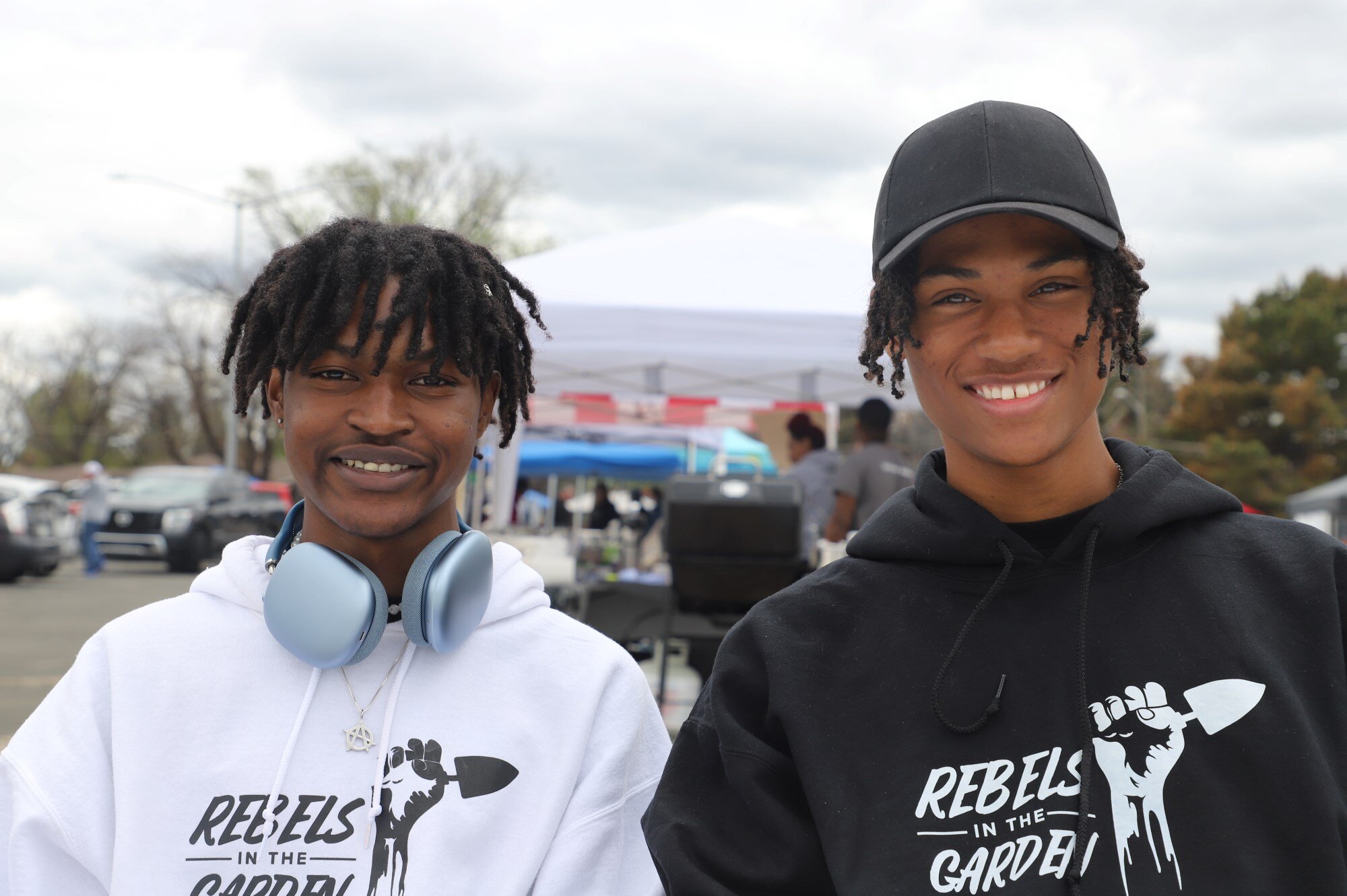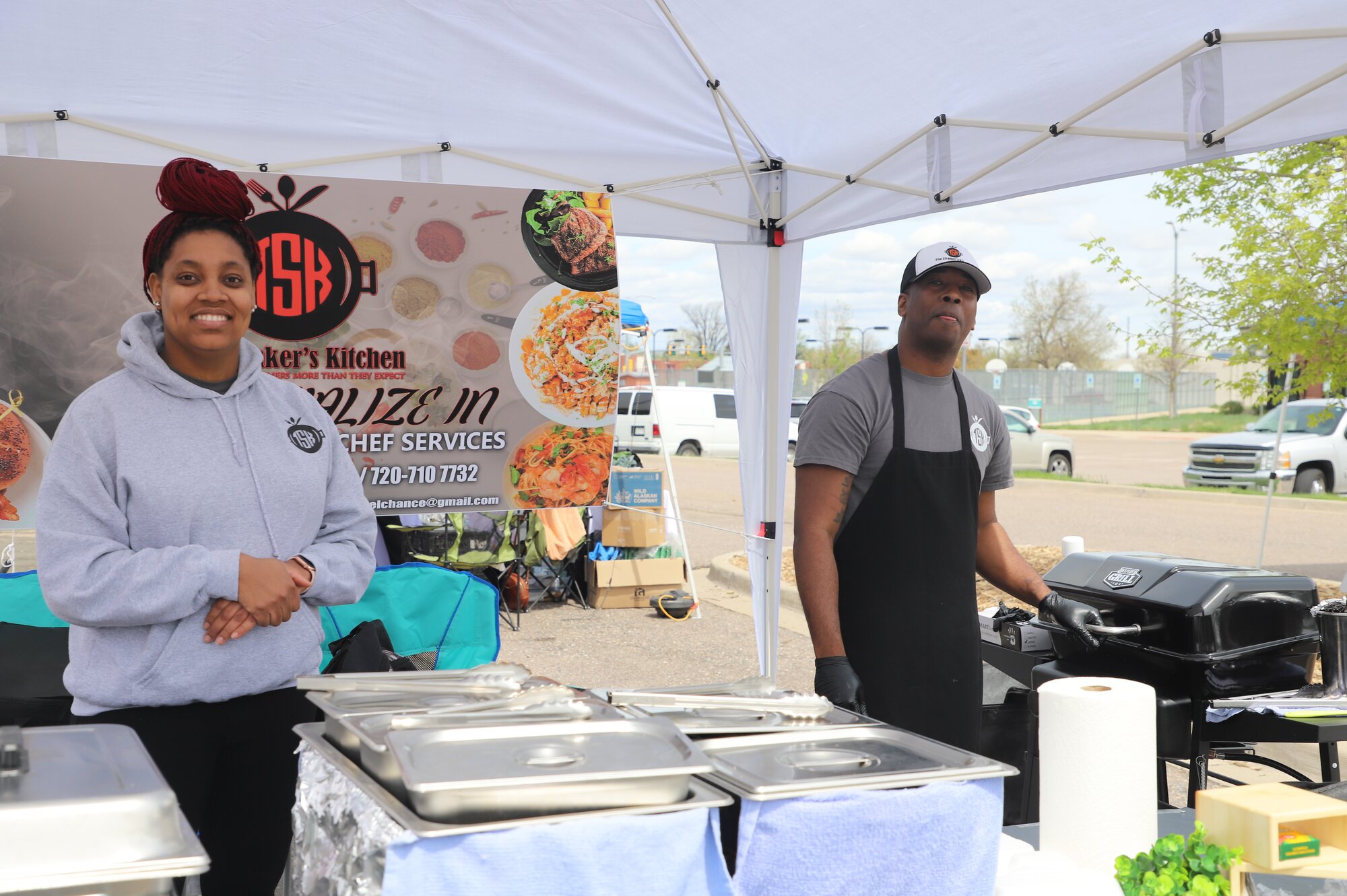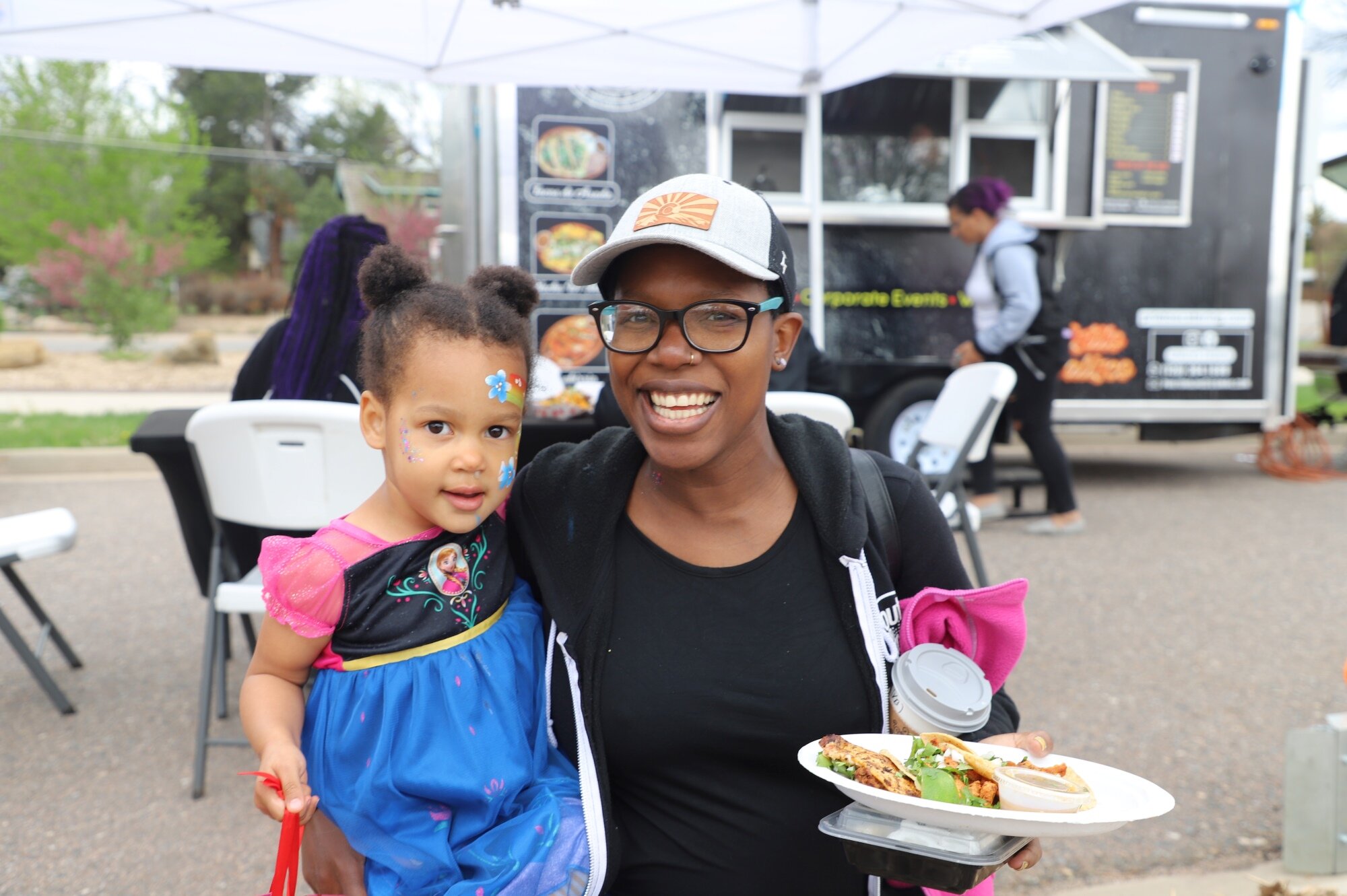How a backyard garden bloomed into a community-centered farmers' market

AURORA, Colo. — After a week of record-breaking rain and flooding in the area, colorful tents brightened up Del Mar Park in Aurora on a recent Saturday morning.
The farmers’ market was buzzing with the laughter of children with freshly painted faces, multi-generational families with bags of treats, and the smell of grilled meats and spices.
In many ways, it seems like any spring farmers’ market. But take a longer look peek behind the curtain, and you will see the market is far from average.
Rebel Marketplace is rooted in education, communal interdependence and a taste of revolution.
Food as a unifier
James Grevious and his family started Rebel Marketplace as an act of rebellion after planting a garden with his family in a small corner of their yard in Denver’s Montbello neighborhood.
According to his nephew Elijah Kanwai, “He was trying to get us outside, off the games.”

But the core of Grevious’ mission ran much deeper than getting the kids to unplug.
Grevious served 17 years in the military as an aircraft mechanic. During this time, he visited 30 countries. One observation that stuck with him during his nearly two decades traveling the world was the way other cultures regard food.
“Here in America food is just food. We consume it without any connection to our broader community or in a matter that doesn't show love,” he observed. “People in ‘poorer’ countries may not have a lot of resources but they have a rich food culture and they will always offer you a plate.”
Grevious also observed how the mentality of food-centered communities played out in marketplaces, where people in other countries would gather intentionally to connect and share resources.
“For Rebel Marketplace, I wanted to bring a bit of that experience back home to wear where I live,” he said.
Inspiration found in a food desert
When Grevious decided to start urban farming with his family in 2015, they had been living in Montbello for 7 years.
According to data from the University of Denver, Montbello is considered a food desert, meaning there aren’t enough sources of fresh and affordable foods for the people who live there, and that only 33% of residents live within a mile of a grocery store. Montbello’s last remaining grocery store, a Safeway, closed in 2014.
“We’re reliant on acres and acres of farms way out of the community to truck food. And if those things break down, it’s an issue for some of these cities, especially in areas that are already food deserts,” he explained.
That’s where Rebel Marketplace comes in. “We're not gonna solve that problem, but we can at least supplement and have a parallel system to support that existing food system,” he said.
While Rebel Marketplace’s location is not in a food desert, Grevious says this mentality is still applicable.
“Our grocery stores in this area are run-down and poorly stocked. It feels more like an institution than a gathering place to access fresh food,” he shared. “I may not be in a food desert, but I am in a food swamp.”
Affordability is another essential element, which is why Rebel Marketplace now accepts SNAP EBT cards.
Beyond the market, Grevious has implemented lessons learned in the importance of food supply by helping neighbors with their own farming.
“I see Uncle James reaching out to all over the community, helping people build plots and even their background or backyard so that they can have something to look out for and take care of,” shared Kanwai.

Small business support
Another element of cultivating a self-reliant community, Grievious said, is supporting small businesses.
He explained that mutual support of local businesses creates reliable resources to meet any needs, whether it’s food, wellness products or other elements. “We all have a business infrastructure where we can lean on each other.”
When choosing vendors, Grevious prioritizes small, new and locally owned businesses. These include immigrant-owned vendors like The Straker’s Kitchen, a Caribbean catering company, and youth-centered vendors like The Cake Pop Kids.
“I'm really interested in, ‘This is my first time, I don't know what I'm doing,’” Grevious continued. “Rebel Marketplace is for you, ‘cuz we're all figuring it out, right? And it's intimidating going to a real established market where everybody's been in the game for 10,15 years.”
Rebel Marketplace has also partnered with Rocky Mountain MicroFinance Institute, or RMMFI. RMMFI provided 10 of the vendors, partnered with Rebel on a business course and gave the vendors funding to be part of the market.
Renel Chance-Straker of The Straker’s Kitchen was one of said vendors. Straker and her husband Enon met while working at a resort in the Caribbean, Renel as a butler and Enon as a sous chef.
The couple decided to try a company of their own when a delighted customer said, “You know what, you can really cook, you should do this on your own, making money on your own versus working for somebody.”
Once they moved to Denver, they came across RMMFI and joined in order to get basic resources for starting a business. According to Straker, it’s a move they don’t regret.
“They just give you the necessary tools and the pathway to just go after it. And it's okay to make mistakes because they're there to help you. They like, they keep you accountable. So it's like they're always there for you if you need support, guidance, and even to grow the business,” she said.

Renel (left) and husband Enon are excited to launch their catering company with the support of Rebel Marketplace and RMMFI.
Community at its core
According to Straker, Rebel Marketplace was a great start for the company, not only because of the business element, but because it was a needed welcome into the community.
“It has a home vibe to it,” she said. “You're here to make money, but it doesn't feel like you're selling.”
Straker continued, “I'm not even nervous. People walk up to us. I'm excited to talk about where I'm from. I'm excited to talk about my food. I'm excited to talk about what's in the food.”
And while magic unfolds organically at Rebel Marketplace, the seed of community was planted intentionally. Shared resources and reliance blossomed into authentic connections.
“He uses his resources to his advantage,” Elijah said of Grevious. “We didn't have the most amount of land, but we had other people who would supply us with soil or, or good deals on seeds or things like that. Just little things that could cut costs, because we weren't always funded and a lot of the things that we had to do were out of pocket and out of our own time.”
According to Grevious, the element of connection is absolutely essential not only to the success of Rebel Marketplace, but society as a whole.
“We have all these differences all the time,” said Grevious. “But the one thing that we always do have in common is these basic elements. We all need water, we all need shelter, we all need food, and we all need community.”

Rebel Marketplace will be running every first and third Saturday through October. Learn more here.
Elle Naef is a multimedia producer at Rocky Mountain PBS. You can reach her at ellenaef@rmpbs.org.